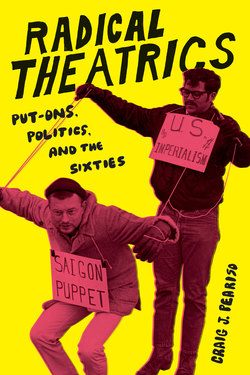Читать книгу Radical Theatrics - Craig J. Peariso - Страница 6
На сайте Литреса книга снята с продажи.
ОглавлениеACKNOWLEDGMENTS
THIS PROJECT WOULD NEVER HAVE BEEN FINISHED WITHOUT THE help of a number of colleagues, friends, and family members. From the project’s origins to its current state, the input and support of the following have been invaluable. I owe particular thanks to Jonathan Katz, without whose advice a project of this breadth would have seemed unthinkable. His comments on early drafts of this work kept me focused and moving forward at a stage when it would have been all too easy to follow any number of false leads. Joseph Monteyne, John Lutterbie, Seth Clark Silberman, and James Rubin also provided valuable feedback on early versions of much of what follows, helping me to sharpen my thinking on a number of issues the work raises. More recently, the anonymous readers for the University of Washington Press offered thoughtful and incisive criticism, which in turn led me to further refine the arguments presented herein. To them I am incredibly grateful.
Archivists at numerous libraries have also played a key role in the completion of this work. Specifically, I would like to thank Terry Goldich and the staff at the University of Connecticut’s Thomas J. Dodd Research Center. Their award of a Sigmund Strochlitz Travel Grant and their assistance in navigating the Hoffman family papers were vital in the earliest stages of my research. I would also like to express my gratitude to the archivists and staff at the New York Public Library, and at the Special Collections at Stanford University Library, for providing me with access to the International Gay Information Center Archives and the collected papers of Black Panther Party founder Huey P. Newton.
The list of colleagues and friends who have helped with various forms of professional, intellectual, and moral support over the years is far too long to include. There are, nevertheless, those whose omission would be unforgiveable. To my colleagues Zainab Bahrani, Francesco Benelli, Holger Klein, Matthew McKelway, Bill Hood, Caroline Earley, Kate Walker, Anika Smulovitz, Beverly Howard, Dominick Longbucco, Barrett Norman, Andy Goodman, and Michal Temkin-Martinez, I would like simply to say, “Thank you.” Any attempt to formulate a specific debt I might owe you individually would only prove embarrassing. To Chad Laird, J. P. Park, Sarah Cartwright, Yvie Fabella, and Terry McLaughlin, I owe my gratitude not only for their friendship but also for their understanding and forgiveness in those times when the demands of this project—among other things—kept me from writing or calling as often as I would have liked. I must also thank Mike Hoglund and John Gold for their generosity and technical support; without their help, this work would have taken so much longer. Joel and Naomi Rosenthal, and Miranda Townsend and Jonathan Bayer provided me with homes away from home, playing an important, albeit unexpected, role in bringing this project into being. Similarly, Dave and Carol Hoglund may (still) never know just how much I appreciate their help and hospitality. And special thanks are due to my parents, Larry and Sharon, and my sisters, Stephanie and Katrina, without whom I would never have written a word.
I also owe thanks to Columbia University Press for allowing me to reprint “The ‘Counterculture’ in Quotation Marks: Sontag and Marcuse on the Work of Revolution” from The Scandal of Susan Sontag, edited by Barbara Ching and Jennifer Wagner-Lawer, 154–70, © 2009; and to Cambridge University Press for allowing me to use “‘Styleless Style’: What Photorealism Can Tell Us about ‘the Sixties’” from the Journal of American Studies 47, no. 3 (August 2013): 743–57 (portions of both appear in revised form in the introduction). Taylor and Francis has allowed me to reprint “Formlessness as Figure: Guerrilla Theater and the Image of Utopia” from Third Text 17, no. 3 (Fall 2003): 261–71; and Cambridge Scholars Publishing has allowed me to use “Commercials for the Revolution: ‘Movement Celebrities’ and the Theatricality of Protest” from Film and Television Stardom, edited by Kylo Patrick Hart, 161–79, © 2008 (both of which appear in revised form in chapter 1). And Berghahn Books has allowed me reprint portions of “Representing Black Power: Handling a ‘Revolution’ in the Age of Mass Media” from Media and Revolt: Strategies and Performances from the 1960s to the Present, edited by Kathrin Fahlenbrach, Erling Sivertsen, and Rolf Werenskjold © 2014 (appearing in chapter 3).
Finally, I will offer my deepest gratitude to Sarah Hoglund, who for more than a decade has provided me with support and encouragement, regardless of context. Without her, nothing I do could ever be called complete.
